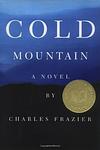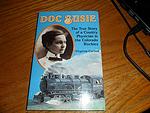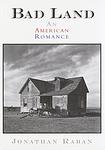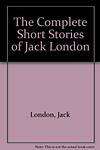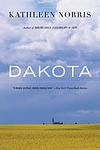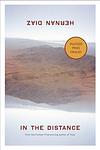The Greatest "Frontier and pioneer life" Books Since 1980
Click to learn how this list is calculated.
This list represents a comprehensive and trusted collection of the greatest books. Developed through a specialized algorithm, it brings together 300 'best of' book lists to form a definitive guide to the world's most acclaimed books. For those interested in how these books are chosen, additional details can be found on the rankings page.
Genres
Frontier and pioneer life is a category of books that focuses on the experiences of individuals and communities who lived on the edge of civilization during the expansion of the United States in the 19th century. These books typically explore the challenges and triumphs of settlers as they established new homes, farms, and towns in the wilderness, often facing harsh weather, dangerous wildlife, and conflicts with Native American tribes. The genre also includes stories of explorers, fur traders, and other adventurers who ventured into uncharted territories, as well as memoirs and biographies of notable figures who played a role in shaping the American West.
Countries
Date Range
Reading Statistics
Click the button below to see how many of these books you've read!
Download
If you're interested in downloading this list as a CSV file for use in a spreadsheet application, you can easily do so by clicking the button below. Please note that to ensure a manageable file size and faster download, the CSV will include details for only the first 500 books.
Download-
1. Lonesome Dove by Larry McMurtry
The book tells the story of two retired Texas Rangers who embark on a perilous cattle drive from Texas to Montana in the 1870s. The narrative focuses on the duo's adventures and the characters they meet along the way, including a variety of outlaws, Indians, and settlers. This epic tale of the Old West explores themes of friendship, unrequited love, and the harsh realities of frontier life.
-
2. Cold Mountain by Charles Frazier
"Cold Mountain" is a novel set during the American Civil War, following a wounded Confederate soldier who deserts the army to make a perilous journey back home to his beloved. The narrative alternates between his arduous trek and the struggles of the woman he left behind as she tries to maintain their North Carolina homestead. The novel explores themes of love, survival, and the destructive impact of war on the human spirit.
-
3. Remembering Babylon by David Malouf
The novel explores the life of a young man who, after being shipwrecked, is raised by Aboriginals in 19th century Australia. After sixteen years, he attempts to reintegrate into European society, but is met with suspicion and hostility due to his adopted culture and lifestyle. The book delves into themes of identity, belonging, and the clash between Aboriginal and European cultures.
-
4. The Solace of Open Spaces by Gretel Ehrlich
This book is a collection of essays that explore the author's experiences and observations after moving from the city to the rural landscapes of Wyoming. The narrative delves into the harsh and beautiful realities of living in the American West, the author's personal healing after a tragic loss, and the solace found in the vast open spaces. The book is a profound meditation on nature, solitude, grief, resilience, and the transformative power of landscape.
-
5. The Crossing by Cormac McCarthy
"The Crossing" is a novel set in the late 1930s and early 1940s that follows a young man named Billy Parham and his brother Boyd. The story primarily revolves around their adventures in the United States and Mexico, including their encounters with a wolf, horse traders, and a Mexican outlaw. The narrative explores themes of loss, survival, and the harsh realities of life, set against the backdrop of the American West and the Mexican wilderness.
-
6. Close Range: Wyoming Stories by Annie Proulx
"Close Range: Wyoming Stories" is a collection of short stories that depict the harsh, rugged life in Wyoming. The book portrays the lives of various characters, from ranchers to rodeo cowboys, who are struggling with poverty, loneliness, and the harsh physical environment. The stories are characterized by a strong sense of place, dark humor, and vivid descriptions of the western landscape. The characters' struggles with their harsh environment and personal demons create a poignant and often tragic portrait of life in the American West.
-
7. Days Without End by Sebastian Barry
"Days Without End" is a historical fiction novel that follows the life of an Irish immigrant who enlists in the U.S. Army in the 1850s. The protagonist's experiences include fighting in the Indian Wars and the Civil War, as well as falling in love with a fellow soldier. The novel explores themes of identity, love, and survival in a brutal and unforgiving era of American history.
-
8. Train Dreams by Denis Johnson
The novella captures the life of Robert Grainier, a day laborer in the American West during the early 20th century. Through a series of vignettes, it traces Grainier's experiences from his work on railroads and bridges to his personal tragedies, including the loss of his family and the profound changes in his way of life. Set against the backdrop of a rapidly transforming America, the narrative delves into themes of isolation, the ruggedness of the frontier, and the impact of industrialization on the natural world and the human soul. Grainier's story is one of quiet endurance and the haunting beauty of the landscape amidst the relentless march of time.
-
9. All But The Waltz by Mary Clearman Blew
"All But The Waltz" is a poignant memoir that weaves together personal narrative and the history of the American West. Through a series of essays, the author reflects on her family's past and the hardships they endured, including loss, isolation, and the struggle to maintain a ranch in the harsh Montana landscape. The book delves into themes of memory, identity, and the changing face of the West, as the author grapples with her own place in a lineage of strong but troubled ancestors. It is a meditation on the complexities of family legacy and the bittersweet dance of embracing one's heritage while stepping into the future.
-
10. Doc Susie: The True Story Of A Country Physician In The Colorado Rockies by Virginia Cornell
This book chronicles the inspiring life of a pioneering female physician who, in the early 20th century, left her comfortable city life to practice medicine in the harsh, unforgiving environment of the Colorado Rockies. Facing the challenges of isolation, gender bias, and limited medical resources, she earned the trust and respect of the rugged community through her tireless dedication, compassion, and medical skill. Her story is a testament to the indomitable spirit of an extraordinary woman who overcame societal constraints and personal adversities to serve the needs of her rural patients.
-
11. Follow the River by James Alexander Thom
"Follow the River" is a historical novel based on the true story of Mary Ingles, a woman who was captured by Shawnee Indians in 1755 during the French and Indian War. After being taken to Ohio, Mary, who was pregnant at the time of her capture, gives birth and is subsequently separated from her baby. Despite the harrowing circumstances, she manages to escape with another woman. The narrative follows her perilous 1,000-mile journey through the wilderness, back to her home in Virginia, showcasing her resilience, courage, and unwavering determination.
-
12. Ganado Red: A Novella And Stories Of The Southwest by Susan Lowell
This collection presents a tapestry of tales set in the American Southwest, blending the region's rich cultural heritage with its rugged landscape. The novella and accompanying stories weave together the lives of diverse characters, from cowboys and Native Americans to modern-day women, all navigating the challenges and triumphs of life in this unique part of the United States. The narratives explore themes of identity, tradition, and resilience, painting a vivid portrait of the Southwest and the indomitable spirit of its inhabitants.
-
13. Bad Land: An American Romance by Jonathan Raban
This book is a historical exploration of the American West, specifically the region of Eastern Montana. The author delves into the experiences of the British and Scandinavian settlers who were lured to this area in the early 20th century by railroad advertisements promising fertile farmland. Through a combination of historical research, personal narratives, and travelogue-style observations, the author paints a vivid picture of the harsh realities these settlers faced, including drought, isolation, and economic hardship. The book also reflects on the lasting impact of these experiences on the region's culture and identity.
-
14. The Good Lord Bird: A Novel by James McBride
The novel is a fictional account of the life of notorious abolitionist John Brown, told from the perspective of a young, freed slave named Henry Shackleford. Disguised as a girl for his own safety, Henry becomes a member of Brown's motley family of abolitionist soldiers, and finds himself in the historic 1859 raid on the U.S. Armory at Harpers Ferry. The book blends historical facts with imaginative storytelling, providing a humorous yet poignant exploration of race, religion, and identity in America.
-
15. Once Upon An Eskimo Time by Edna Wilder
This book is a heartfelt collection of stories and memories that offer a window into the traditional lifestyle of the Inupiat Eskimos of Alaska. The narrative, rich with cultural heritage, is a personal account from the author's own experiences growing up in a remote village. It captures the essence of a community bound by survival, tradition, and the rhythms of the Arctic environment. Through tales of hunting, fishing, and sharing, the book paints a vivid picture of the values and practices that have sustained the Inupiat people for generations, while also touching on the challenges and changes brought by contact with the outside world.
-
16. Little Heathens: Hard Times And High Spirits On An Iowa Farm During The Great Depression. by Mildred Armstrong Kalish
"Little Heathens" is a memoir of Mildred Armstrong Kalish's childhood on an Iowa farm during the Great Depression. Kalish recounts the daily struggles and joys of life on the farm, from making do with limited resources to finding creative ways to entertain themselves. Through her vivid descriptions and humorous anecdotes, Kalish paints a picture of a resilient and close-knit community that persevered through tough times with a spirit of determination and optimism.
-
17. Cities of the Plain by Cormac McCarthy
"Cities of the Plain" is the conclusion to a trilogy set in the post-World War II American West. The story follows two cowboys, John Grady Cole and Billy Parham, who work on a ranch in New Mexico near the Texas border. Cole falls in love with a Mexican prostitute, which leads to a tragic confrontation with her pimp. The novel explores themes of love, friendship, and the fading of the old West.
-
18. The Complete Short Stories of Jack London by Jack London
This collection features the complete short stories written by a renowned American author, known for his vivid portrayals of adventurous and survivalist themes. The stories, often set in the harsh landscapes of the Klondike Gold Rush or the South Pacific, examine complex human nature, survival instincts, and socio-economic conditions of the time. The author's unique storytelling style, combined with his keen observational skills and deep understanding of human psychology, makes each story a compelling read.
-
19. Half Broke Horses: A True Life Novel by Jeannette Walls
Half Broke Horses is a novel based on the life of the author's grandmother, Lily Casey Smith, who grew up in the early 1900s on a ranch in Texas. The book follows Lily's journey from a young girl with a thirst for adventure to a strong-willed woman who becomes a teacher, a rancher, and a mother. Despite facing numerous challenges and setbacks, Lily remains determined and resilient, forging her own path in a world that often tries to limit her. The book is a tribute to the indomitable spirit of one remarkable woman and a celebration of the American West.
-
20. Dominion by Calvin Baker
"Dominion" is a thought-provoking novel that weaves together the lives of four individuals across different time periods, from the American Revolution to the modern era. The narrative explores the complex tapestry of American identity, delving into themes of race, freedom, and the enduring struggle for equality. Through the interconnected stories of its characters, the book examines the historical and ongoing impact of colonialism and slavery on the United States, offering a reflective look at the nation's past and its influence on the present and future. The novel serves as a poignant commentary on the quest for personal and collective sovereignty in a country still grappling with the consequences of its foundational injustices.
-
21. Prairie Fires: The American Dreams of Laura Ingalls Wilder by Caroline Fraser
This book presents a deeply researched biography of Laura Ingalls Wilder, the author of the "Little House on the Prairie" series. It provides an in-depth look into Wilder's life and the historical context in which she lived, from the westward expansion to the Great Depression and beyond. The narrative explores the complex relationship between Wilder and her daughter, the hardships they faced, and the ways in which these experiences shaped Wilder's writing. It also delves into the myths and realities of American frontier life, challenging the often-romanticized view of pioneer life.
-
22. Dakota by Kathleen Norris
"Dakota" is a reflective and poetic exploration of life in the rural plains of South Dakota. Blending memoir with historical and spiritual insights, the book delves into the author's personal experiences and observations after moving from New York to her ancestral home in the Dakotas. It examines themes of solitude, community, the harshness and beauty of the landscape, and the challenges and rewards of small-town life. The narrative also thoughtfully considers how the simplicity and stillness of the plains influence the spiritual and everyday lives of their inhabitants, offering a profound meditation on place and identity.
-
23. In The Distance by Hernan Díaz
The novel follows the epic journey of a young Swedish immigrant named Håkan Söderström, who is separated from his brother during their voyage to America. Stranded in California, Håkan embarks on a quest to reunite with his sibling, traveling eastward through an unrecognizable and often hostile American frontier. Along the way, he encounters a diverse cast of characters and experiences the harsh realities of the Gold Rush era, transforming from an innocent boy into a mythic figure. His odyssey is marked by moments of profound isolation and violence, as well as encounters that challenge his understanding of the world and his place within it.
-
24. Inland by Téa Obreht
Set in the arid American West of the late 1800s, the novel weaves together the lives of two remarkable characters: a frontierswoman awaiting the return of her sons and husband to their drought-ridden homestead, and an outlaw on the run from his past, haunted by visions of lost camels and a mysterious boy. Their stories converge in a desolate town, where their fates intertwine through a series of events that encompass both the supernatural and the deeply human. The narrative explores themes of survival, myth, and the intersection of different cultures against a backdrop of a harsh and unforgiving landscape.
-
25. Shadow Country by Peter Matthiessen
Shadow Country is a historical novel that explores the life of outlaw and entrepreneur Edgar J. Watson, a notorious figure in the late 19th and early 20th century American South. The narrative delves deep into Watson's complex character, his violent deeds, and the mystery surrounding his death, providing a panoramic view of the lawless frontier life in Florida's Everglades. The story is told from multiple perspectives, each revealing a different aspect of Watson's life and the era he lived in, making it a compelling study of human nature and the American frontier.
Reading Statistics
Click the button below to see how many of these books you've read!
Download
If you're interested in downloading this list as a CSV file for use in a spreadsheet application, you can easily do so by clicking the button below. Please note that to ensure a manageable file size and faster download, the CSV will include details for only the first 500 books.
Download
